NHIndustries NH90
The NHIndustries NH90 is a European medium-sized, twin-engine, multirole military helicopter. It was developed in response to North Atlantic Treaty Organization (NATO) requirements for a battlefield helicopter which would also be capable of being operated in naval environments. The NH90 was developed and is manufactured by NHIndustries, a collaborative company owned by Airbus Helicopters, Leonardo (formerly AgustaWestland) and Fokker Aerostructures. The first prototype conducted its maiden flight in December 1995; the type first entered operational service in 2007. As of June 2022, the NH90 logged 327,053 flight hours in the armed forces of thirteen countries.[2] It is an advanced but high maintenance military helicopter employed by a dozen countries in two major versions. There is a Naval version that can land on ships and is used for sea rescue and submarine warfare, and an Army version which has been used for transporting cargo, people, medivac, and for special operations.
| NH90 | |
|---|---|
_in_the_Bay_of_Bengal_(cropped).jpg.webp) | |
| A French Navy NH90 | |
| Role | Medium utility military helicopter |
| National origin | Multinational |
| Manufacturer | NHIndustries |
| First flight | 18 December 1995 |
| Introduction | 2007[1] |
| Status | In service |
| Primary users | Italian Armed Forces Bundeswehr French Armed Forces Netherlands Air Force |
| Produced | 1995–present |
| Number built | 471[2] |
The NH90 is the first production helicopter to feature entirely fly-by-wire flight controls.[3] There are two main variants, the Tactical Transport Helicopter (TTH) for army use and the navalised NATO Frigate Helicopter (NFH); each customer typically has various alterations and customizations made to their own NH90 fleets, such as different weapons, sensors, and cabin arrangements, to meet their own specific requirements. In addition, local construction of airframes was accommodated in many cases, giving participants in the program to create local experience in construction. However, despite many advanced features there has been a series of complaints about the overall experience in service, delays in delivery, high maintenance, software issues, and durability leading to an early retirement of some fleets. Nevertheless, it has served in increasing number and roles in the 2010s taking on Naval search and rescue, ASW, troop transport, Special operations, various resupply and disaster relief, and medical evacuation.
Since its introduction into service, the NH90 has suffered several technical issues, which have delayed active deployment of the type by some operators. In 2022, Norway terminated the program and demanded a full refund, while Australia has decided to retire the type ahead of schedule, originally due to be in service until 2037.[4] Belgium and Sweden are also looking into migrating into a new airframe. However, 12 other countries continue on with the product, while additional orders and improvements equate to ongoing and widespread use of aircraft despite some unresolved crash investigations. Improved maintenance regimes remain a focus for operators.
Development
Origins
.jpg.webp)
In 1985, France, West Germany, Italy, the Netherlands, and the United Kingdom teamed to develop a NATO battlefield transport and anti-ship/anti-submarine helicopter for the 1990s. The United Kingdom left the team in 1987.[5] On 1 September 1992, NH Industries signed an NH90 design-and-development contract with NAHEMA (NATO Helicopter Management Agency).[6] This agency represented the four participating states: France, Germany, Italy, and the Netherlands. Portugal later joined the agency in June 2001. Design work on the helicopter started in 1993.[7] The first prototype, PT1, made the type's first flight on 18 December 1995.[5][7] The second prototype, PT2, first flew on 19 March 1997 and the third prototype, PT3, on 27 November 1998.[7] On 12 December 2002, PT3 became the first helicopter to fly exclusively with fly-by-wire controls following the removal of mechanical back-up controls.[8]
The NH90 was developed into two main variants: the Tactical Transport Helicopter (TTH) and the NATO Frigate Helicopter (NFH).[5] These two main variants share about 75% commonality with each other.[9] Many of the operators have requested specific configurations to their own helicopter fleets, thus each country's NH90 is effectively customized to the end-user's requirements. During the development phase of the programme in the 1990s, both technical and funding problems were experienced.[10] In June 2000, the partner states placed a large production order, worth US$8.6 billion, for a total of 366 helicopters.[5][11] Additional orders have since followed from customers in Europe, Asia, and Australia. By April 2013, a total of 529 NH90s of all variants were on order by various customers.[12] As of early 2023, there were 597 on order, and the 500th airframe was delivered at that time.[13]
Production
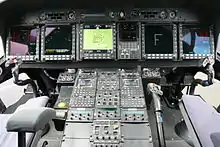
The NH90 was initially intended to be produced at three exporting final assembly lines (FAL): Cascina Costa in Italy for AgustaWestland, Marignane in France and Donauwörth in Germany for Airbus Helicopters. The Nordic and Australian contracts stipulated production locally (the Nordic ones at Patria in Finland and the Australian ones in Brisbane). Spain has a final assembly line at Albacete.[14][15] The Marignane assembly line can reportedly complete up to 22 NH90s per year.[9]
Major components are produced by each of the shareholding companies:
- Airbus Helicopters France 31.25% (Engines, rotors, electrical system, flight control, and the core avionics systems)
- Airbus Helicopters Deutschland 31.25% (Forward and center fuselage, fuel system, communications, and avionics control systems)
- Fokker 5.5% (Tail structure, doors, sponsons, landing gear, and the intermediate gearbox)
- AgustaWestland 32% (Rear fuselage, main gearbox, hydraulic system, automatic flight control and plant management systems, power plant, and the NFH mission system)
Items built by the shareholding companies are then distributed to the six locations for assembly and flight test (Marignane, France; Tessera, Italy; Donauwörth, Germany; Halli, Finland; and Brisbane, Australia).[16]
In late 2006, the German Army, the first customer to receive production aircraft, accepted delivery of its first NH90 TTH.[17] In April 2010, the Royal Netherlands Navy was the first customer to receive the navalised NH90 NFH variant.[18] In June 2014, the consortium announced that it had completed delivery of the 200th NH90; at that point, the backlog of orders was reported as reaching out to 2020.[19] In order to alleviate delays and reduce the complexity of manufacturing a large number of NH90 variants, NH Industries proposed the adoption of a simplified baseline airframe which could be configured to the individual customer's requirements.[19] Between 2004 and 2016, the production lead times for the NH90 had reduced from 18 months to 7.5 months.[20]
In 2014, worldwide production of the NH90 peaked at 53 helicopters per year.[20] In October 2015, the delivery of the 250th NH90 was formally accepted by the Italian Army.[21] In 2015, the rate of NH90 production declined, reportedly due to countries choosing to delay their orders and some contracts having been fulfilled; in 2016, the Finnish final assembly line became the first to close with its orders completed.[20] In 2023, the 500th NH90 was delivered to the French Army, from the Marignane facility.[13]
Although no US order have been taken, its been noted it might be produced at Airbus facility in Mississpi, USA which produces AS350. Likewise, some effort was put being ready for a civilian certificate no program has been attempted to get these certificates. However, a VIP or Passenger version would likely use increased cabin space which has been produced for Sweden.[22]
Concerns over performance
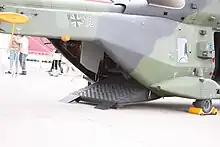
In 2010, German tabloid Bild reported that German Army experts had concerns that the helicopter was not yet ready for the transportation of combat troops. They stated that the seats were rated for only 110 kg (240 lb), not considered enough for a fully equipped soldier. Heavy infantry weapons could not be adequately secured and the cabin floor was prone to damage, citing an anecdote of damage caused by footwear. The helicopter could only land on firm ground, with obstacles not exceeding 16 cm (6.3 in). Troops carrying full equipment could not use the rear ramp due to weight-limitations placed on it. Adding a door machine gun was not possible due to space taken by troop ingress and egress; there was also no provision for fast roping or paratrooper equipment.[23] In response, the German Defense Ministry proclaimed that this article referred to a prototype, not to the production model; the specifications for which were not even finalised at the time. The prototype evaluation and its results were described as a normal procedure in an ongoing design process.[24]
In November 2011, the MRH90 program was placed on the Australian Department of Defence's "Projects of Concern" list.[25] The most serious problem identified by a diagnostic review, which caused a brief grounding in 2010,[26] is compressor blade rubbing caused by the bending of a spool in the Rolls-Royce Turbomeca RTM322 engine due to uneven cooling after shutdown. Other problems identified include failure of transmission oil cooler fans, windscreen cracking, an inertial navigation system that is slow to align, and the weakness of the cabin floor to withstand the impact of soldiers' boots – a problem also encountered in German service.[27]
In March 2014, it was announced that a Dutch NH90 had suffered higher than expected fuselage wear and corrosion following an extended deployment at sea; analysis by the Dutch National Aerospace Laboratory attributed the corrosion to design and assembly flaws. However, the aircraft were not grounded. In response, NHIndustries launched a corrosion prevention programme and enacted several design modifications.[28] In December 2014, Dutch NH90 deliveries, which had been temporarily halted earlier in the year, restarted after the majority of identified points were addressed and an agreement was made by the manufacturer to bear the cost of developing modifications, repairs, and preventive measures against corrosion.[29]
Costs of operation
_in_the_Bay_of_Bengal_in_February_2016.JPG.webp)
Ron Mark, New Zealand First Deputy Leader and Spokesperson for Defence put out a press release in 2017 criticising the cost of the NH90, citing the statistics of 2015, "The NH90s cost $1,182 an hour to fly and that is 2.5 times more expensive than the Iroquois they replaced. They're also unreliable, chewing through $3.3 million worth of spares in just two years."[30]
The operating cost of a NH90 HCV (High Cabin Version) was largely reported in Swedish media during 2018 as being at least 200,000 SEK (later specified to 242,000 SEK when the McKinnley report, ordered by the Swedish defence, was published) per hour flown, or about US$28,000. In contrast, the Hkp 16, MH-60 Blackhawks in Swedish service had a cost of 40,000 SEK per hour, something that sparked a heated debate not least since it was revealed that the defence minister had demanded that the purchase had to be a joint procurement with the other Nordic countries which in turn excluded all other contenders.[31][32][33] A while later, a new debate among the defence bloggers begun, when it was revealed that a lot of the high costs actually was the result of the accounting practices forced upon the Swedish defence forces. The purchase cost and annual services had been factored in meaning that the cost per hour increases the less flight time per year the helicopter gets.[34] In this debate, it was also pointed out that the Finnish defence had budgeted CPFH to €15,900 in 2017, which the year after had been lowered to €10,000.[35]
In 2020, the Belgian ministry of defence announced a cut of 40% to the annual flight time for the NH90. The reason cited that while the old Westland Sea Kings retired in 2019 had a cost per flight hour of around €5,000. The NH-90 is more than double that at €12,000. per hour. In addition, the reliability is so low that "the services do not have enough personnel to keep them flight-worthy".[36]
The Australian Parliament released their report "MRH-90 Taipan helicopter: a quick guide" at the end of 2021, detailing the problems that has plagued the helicopter since 2005 and why they now will be replaced. There the CPFH is listed as "the helicopter's estimated operating costs were $30,000 to $40,000 per hour, which is 'higher than those combat aircraft with sophisticated weapons and sensor systems' (p. 72). More recently the cost has increased to $50,000 per hour."[37]
Axel Aloccio, head of NHI since mid-September 2022, believes that most problems stem from the teething issues of a new system that always take a few years of service to find and correct, and that most are either solved or will be addressed with the transformation plan called "New Horizon" that Aloccio's predecessor Nathalie Tarnaud Laude launched. This program for system-wide changes has the aim of 50-60% average global fleet availability by the end of 2022 through better spare part availability and localisation of overhaul services. It also seeks to lower the operating costs, the time between maintenance inspections and overhaul for dynamic components have both been raised by 50% in order to keep them synchronized, from 600/1200 flight hours to 900/1800 hours respectively.[38]
Design
.jpg.webp)
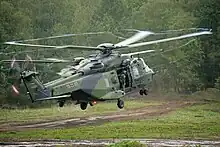
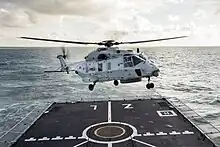
The NH90 was designed to fulfill a NATO staff requirement for a multi-role, medium-sized military helicopter for both land and maritime operations.[39] According to Flight International, the NH90 has the distinction of being the first helicopter in the world to be developed in line with NATO requirements.[40] As such, the design of the NH90 meets with multiple national and international standards, including military airworthiness processes in Germany, France, Italy, and the Netherlands; conformance with FAR 29 and MIL-STDS design standards, as well as DEF-STN 00-970 icing conditions performance and electro-magnetic compatibility.[39] It is produced in two principal variants, the battlefield Tactical Transport Helicopter (TTH) and the maritime NATO Frigate Helicopter (NFH).[41]
One key innovation of the rotorcraft is the four-channel fly-by-wire control system employed; the NH90 is the first helicopter in the world to be equipped with full fly-by-wire flight controls.[3][40] A four-axis autopilot is also integrated with the fly-by-wire system, as are mission and navigation systems to enable greater autonomy during operations and to reduce pilot workload.[42] The flight envelope of the NH90 is capable of all-weather day-and-night operations, ship-borne operations during high sea states, across a temperature range from −40 °C to +50 °C, and up to a maximum altitude of 20,000 feet.[39] Power is provided by a pair of turboshaft engines, dependent on customer selection, the NH90 is either fitted with Rolls-Royce Turbomeca RTM322 or General Electric CT7-8F powerplants; exhaust gases from the engines are filtered through an infrared suppression system for decreased sensory visibility.[41][43] The NH90 has three gearboxes including the Main Gearbox (MGB), Intermediate Gearbox (IGB), and a Tail Rotor Gearbox (TGB).
According to Airbus Helicopters, the NH90 possesses the lowest radar signature in its class, principally due to its diamond-shaped composite fuselage.[42]
The NH90 features an advanced composite airframe, designed for ballistic tolerance, a high level of crashworthiness, lower weight, and 30 per cent greater endurance than a metallic counterpart.[42] The four main rotor blades are also composed of composite materials, increasing fatigue strength and lifespan while providing for greater damage tolerance.[42] The unobstructed main cabin area is entered either by large sliding doors on either side of the fuselage or via a rear ramp, the cabin is designed to accommodate modular equipment packages to enable the rotorcraft to be rapidly reconfigured, providing for operational flexibility.[41][42] In a troop-transport capacity, the cabin can accommodate up to 20 fully equipped soldiers, or up to 12 stretchers in a medical evacuation role, some light vehicles may also be transported; the main cabin is equipped with environmental control systems and sound proofing measures to improve passenger conditions.[41][42]
The NH90 can be equipped with various mission-specific systems, including modular armor plating around the cabin area for undertaking high-risk missions and an ice protection system for operations within cold climates. It can also make use of the Helicopter In-Flight Refuelling System (HIFR) as well as additional internal and external fuel tanks to conduct extended range missions.[41] Other equipment includes a wire strike protection system, rappelling system, hoist, cargo hook, search light and various seating options, including crashworthy foldable seats.[41] For performing maritime operations, such tasked NH90s are typically equipped with the Harpoon deck-locking system, automatic main rotor blade and tail folding mechanisms, and other deck handling systems to conduct all-weather ship-borne operations;[41] it is also typically outfitted with dipping sonar and sonobuoy processing equipment.[19]
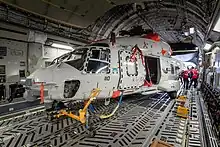
The NH90 features a range of customizable avionics systems, dependent on customer selection and purpose. On some models, French firm Thales Group provides various parts of the avionics, such as the glass cockpit, full-colour multifunction displays, tactical mission and encrypted communication systems, the TopOwl helmet-mounted sight/display, IFF and autonomous navigation systems, and the electrical power generation system.[41][44] Other systems include a forward looking infrared (FLIR), weather radar, digital map generation system, enhanced ground proximity warning system, personal locator system, and VHF/UHF/HF tactical radios.[41] In 2015, the NH90 became the first helicopter to receive a laser-based airborne collision avoidance system.[45] Onboard mission systems feature a dual-redundant databus, are compliant with MIL-STD 1553, and are comprehensively managed via sensor fusion functionality.[39][41] Customer demand for future avionics improvements such as new data links and communication systems, as well as additional electro-optical sensors, have been anticipated by the manufacturer.[19]
The helicopter is equipped with emergency floats which deploy in case of a water landing and are designed to buy the crew enough time to exit the helicopter before it sinks.[46] In 2023, this system was deployed when an Australian NH90 ditched in the water after engine problems while it had ten people aboard, and the inflation system stopped the aircraft from sinking. Everyone survived the water landing and it was possible to tow the helicopter to a beach.[47]
Although a civilian version has not been produced, the NH90 was designed from start to potentially meet FAA certifications. It has not been taken on to qualify for certificate of airworthiness, but the high cabin variant that would be typical of passenger transport has already been produced. If produced, it would fit between the AS365 Dauphin and the AS322 Super Puma in the Airbus production line.[22]
In 2020 an upgraded TFRA2 Special Operations version was announced, going to in service with French feature many specialized modifications on the TTH.[48] This includes extra fuel tanks, twin gun mounts, fast roping from removable rear door, Helmet Mounted Sight Digital Display, and various enhanced or extra visual sensors with displays to increased situational awareness.[48]
Operational history
As of 2023, the NH90 is in service with 12 nations. Two have retired their fleets, Norway, Australia, and two others, Belgium and Sweden and are planning a full are partial early retirement.[49][50][51] Belgium will continue on with Frigate version but move away from the TTH version.[52] Norway (18), Sweden (20), and Finland (14) placed their order as a group as part of the Nordic standard helicopter program, although the order included different types including High Cabin Variant (HCV) of the Swedish order.[53] Going forward, the manufactuer is planning an ambitious plan to increase availability and lower maintenance in response to many customer's issues with there maintenance.[54]
Australia
_NHI_MRH-90_arriving_at_Wagga_Wagga_Airport.jpg.webp)
In 2004, Australia announced a plan to order 12 aircraft to supplement its Army's aging S-70 Black Hawk helicopters.[55] In June 2006, the Australian Defence Force (ADF) announced plans to replace its UH-60 Black Hawk and Westland Sea King helicopters;[56] a further 34 NH90s were ordered, for an order total of 46; four being manufactured in Europe, and 42 being manufactured locally by Australian Aerospace (an Airbus Helicopters subsidiary) in Brisbane.[57] The helicopter's ADF designation and name "MRH-90 Taipan" refers to its use as a "Multi Role Helicopter" and pays homage to a native species of snake.[58][59] The first Australian NH90 entered service in December 2007 with the Army.[61] Later on, six examples would operated by 808 Squadron of the Royal Australian Navy, which was reformed in 2011 and recommissioned in 2013.[62][63] The Navy's were operated until 2022, and the Army fleet until 2023, however it was in 2021 the early retirement was announced shifting from 2037 to 2024.[64] There was overall 46 in service, but 47 procured because one was kept as a spare.[65] The Australian NH90s use the Rolls-Royce Turbemeca RTM322.[66]
On 20 April 2010, an ADF MRH90 suffered a single engine failure near Adelaide, landing safely at RAAF Base Edinburgh. NHIndustries sent personnel to Australia to investigate the failure.[67] On 18 May the ADF announced that the MRH90 fleet was grounded due to engine issues since the April incident.[68] The cause of the failure was determined as the compressor blade contacting the engine casing, leading to new preventative inspections; flights resumed in July 2010.[69] In June 2011, the NFH variant lost to the Sikorsky MH-60R in competition to replace the Royal Australian Navy S-70B Sea Hawks.[70]
_in_July_2015.JPG.webp)
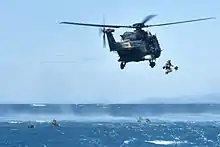
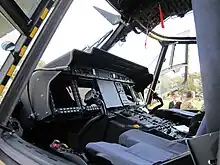
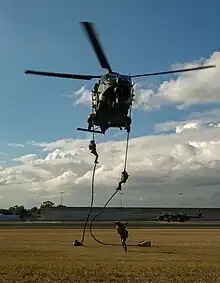
In July 2014, the Australian National Audit Office released a report on the MRH90, citing a series of procurement errors and development deficiencies delaying final operational capability (FOC), originally planned for that month, until April 2019, nearly five years later than planned. Some nine years after the initial contract was signed, the models first delivered in 2007 had not validated any of the 11 set operational capability milestones, and forced redesigns including bolstered cabin floors and windscreens, rappelling hooks, and door gunner positions; obtaining spare parts and sustaining the helicopters has also been more costly. The Australian Army will be forced to operate its aging S-70A Black Hawk beyond their planned retirement date.[71] Due to the delays, Australia will receive an additional helicopter, for a total of 47.[72] By September 2015, most of the MRH90's flaws had reportedly been addressed.[73] In June 2017, the Australian Navy successfully completed trials aboard HMAS Anzac, marking a major milestone in the helicopter programme.[74]
In 2015, the Australian Army decided to delay retiring 20 Black Hawks by 4 years until the end of 2021 in order to develop a special operations capable MRH90.[75][76] This required developing a Fast Roping and Rappelling Extraction System (FRRES) and a gun mount for the cabin door.[75][76] The Taipan Gun Mount can fit either a M134D minigun or MAG 58 machine gun and when not in use can be moved into an outward stowed position to provide clearance to enable fast roping and rappelling.[77][78] In February 2019, the first two of 12 MRH90 helicopters were delivered to the 6th Aviation Regiment.[79][76] On 24 June 2021, all Australian NH-90s were temporarily grounded due to lack of maintenance and spare parts which have to be shipped from Europe to Australia.[80] In December 2021, on the same day the older generation of Black Hawk fleet was retired, the Australian Government announced that it would replace the Army's fleet of MRH90s with new UH-60M Black Hawks.[81][82] In addition, at this time the retirement date for the fleet was shifted to 2024.[64]
The Navy ceased flying their MRH90s in April 2022 and their fleet was placed into storage.[83][84] In May 2022, the government announced that it would replace the Navy's six MRH90s with additional H-60R Seahawks.[85][86] The Navy already was operating 24 Seahawks delivered between 2013 and 2016, and these served along with the NH-90 fleet.[87]
In March 2023, an Army MRH90 carrying 10 crew members appeared to malfunction mid-flight while hovering over a Jervis Bay beach at night during a training exercise, forcing the pilots to make a controlled ditch into the water. Following the incident, the fleet of 47 MRH90s were grounded pending an investigation.[88] The ten crew survived and the helicopters were to be towed onto a nearby beach after ditching in the water.[88] Early indications of the event in April implicated a missing software patch in the helicopter's flight software, however an official explanation was still pending.[89][90][91] The NH90 fleet was returned to service on 6 April 2023 after the incident, which was called a "operational pause".[91] Previously the fleet had been grounded three times in the 2010s for different reasons.[91]
In July 2023 another MRH90 crashed at night during Exercise Talisman Sabre off the coast of Hamilton Island, Queensland, resulting in four missing crew members.[92][93][94] By early August the cockpit and human remains were found in a debris field in 40 meters of water, constient with a catastrophic impact.[91] On 8 August 2023 Australian divers successfully recovered the flight date recorder from the fatal crash.[95] Although an official explanation of the earlier March 2023 incident and July crash was not immediately clear, defense officials seemed optimistic the fleet would return to service and be retired in late 2024.[90]
On 29 September 2023, the Australian Government announced that the MRH-90 will not return to service in Australia, bringing forward the previously planned retirement date of December 2024.[96][97] Officials stated the early retirement was not meant to suggest the outcome of the crash investigation, which was still ongoing; the fleet was grounded since the July 2023 crash.[49]
Australia had ordered and procured a total of 47 MRH-90s with some imported and some built locally. At the time of its grounding on 31 July 2023 there were 38 in service.[98] The Australian Navy had previously stopped using their NH90s in 2022.[98] The Army NH90s entered service in December 2007.[61] The fleet in the 2010s was grounded several times for different issues, in the 2020s an early retirement was planned for 2024; after two further incidents in 2023 the fleet was grounded and by September it was decided to retire the fleet at the time.[91] The fleet is planned to be dismantled for spare parts in partnership with NHI, which stated it was working with Australia to identify the cause of the latest crash at that time.[51] Australia had filled the gaps in service created by the grounding, operational pauses, and early retirement, by extending the service life of the aircraft it was replacing, the older S-70s, from 2011 to 2021, by buying a few extra Chinook helicopters as a stop gap, by leasing six AW139, and doing an emergency procurement of another helicopter as its replacement. The Australian Defense had invested 3.5 billion dollars and over two decades in the programme.[64]
Belgium
.jpg.webp)
.jpg.webp)
In 2007, Belgium signed on for a firm order of 8 aircraft (4 TTH, 4 NFH) and an option for 2 additional TTH.[99] In September 2012, NHI performed the first flight of the Belgium's Tactical Transport Helicopter (TTH), which is broadly similar to the French NH90 "Caiman" version.[100] In January 2013, eight NH90s were on firm order.[101] On 1 August 2013, Belgium received its first NH90 NFH at Full Operational Capability (FOC).[102] On 23 October 2013, Belgium's first NH90 TTH entered service, the last was delivered on 13 November 2014. From first delivery until the last, three NH90s flew 34 hours a month for a total of 450 flight hours with a 67 percent availability rate, making Belgium one of the type's most intensive users. Two NH90 NFHs for the navy were delivered, the final two were delivered by early 2015 to replace their Westland Sea King helicopters for Search and Rescue operations.[103]
On 21 August 2015, the Belgian Navy declared its NH90s had attained initial operational readiness;[104] on 28 August 2015, the first rescue mission performed by a Belgian Navy NH90 took place.[105]
In June 2020, The Strategic Defence Review (STAR) of Belgium planned to phase out the 4 TTH helicopters by 2024 due to their high operating costs and low availability. They are planned to be replaced, along with the Agusta 109, by 15 Airbus H145M helicopters. The 4 NFH variants are to remain operational and be provided with currently lacking sensors and weapons for anti-submarine warfare.[106][107] There was some discussion as of 2023, to sell the 4 TTH, and buy 1 more NFH, in addition with acquisition of new helicopters the NFH will no longer do SAR.[108] Belgian is expanding its defense budget and Naval capiblites in the 2030s, and Naval NH90 are planned to be upgraded and to operate from currently in serve frigates (Karl Doorman class). In addition, Belgium is buying a NH90 mission flight trainer in partnership with the Netherlands.[52]
Finland
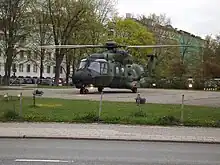
In October 2001, Finland signed a contract for 20 NH90 TTHs for the Finnish Army to replace its ageing fleet of Mil Mi-8 helicopters.[109] This decision was done a group as part of the Nordic Standard Helicopter program along with Sweden and Norway.[53] In March 2008, NH Industries began NH90 deliveries to Finland;[110] deliveries had been delayed from an initial 2004 date, to minimize further delay, aircraft were first delivered to an Initial Operational Configuration (IOC-) and Nearly Operational Configuration (IOC+), to be later modified by Patria into a Final Operational Configuration (FOC).[111][112] In September 2011, the Finnish Defence Forces and Patria signed an agreement to provide ballistic protection for onboard personnel across the NH90 fleet.[113]
In June 2011, nine Finnish NH90s participated in the Finnish Defense Forces' main field exercise, transporting 157 soldiers across 320 kilometers in two rotations; their performance was described as having exceeded expectations.[114] In January 2015, it was reported that Finnish NH90s had been experiencing considerable reliability issues, at one time in 2014 fleet availability dipped to 19%, and some spare parts had up to seven months waiting time.[115] By early 2015, the combined NH90s fleet had accumulated a total of 7,000 flight hours, and had an availability rate of 40%.[116] On 18 June 2015, delivery of the final Finnish NH90 took place.[117] In November 2015, the availability rate was reported as having surpassed 50 percent.[118] All helicopters were in Final Operational Configuration (FOC) in 2018, 17 years after order.
France
.jpg.webp)
The French government had initially ordered a total of 34 NH90 TTHs for the French Army Light Aviation and 27 NFH for the Navy.[119] Both versions will be named "Caïman" and final assembly will be carried out by Airbus Helicopters.[101][120] The French Army had intended to buy 68 NH90; however, the April 2013 defence review could have cancelled the contract for the second batch of 34.[12] Under the "Bonn rebate" deal, France receives a 12% discount on its 68 Army helicopters; a November 2012 Senate report put the French TTH per unit price at €28.6M after discount, set on the assumption of total orders of 605 aircraft by 2020. Cuts to France's order would result in workshare reallocation; possibly including French Navy NFH90s being assembled in Italy and Fokker performing maintenance of French TTHs.[12] On 29 May 2013, France formally ordered the second batch of 34 NH90 TTHs for just under €1 billion.[121] In January 2016, France placed an order for six additional NH90 TTHs.[122]
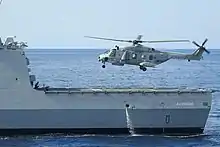
The French Army took delivery of its first NH90 TTH in December 2011.[123] Just one week after entering service, a French NH90 Caiman rescued 19 people from supply ship TK Bremen at night.[124] On 21 December 2012, the French Navy received its first NH90 NFH in final operating capability.[125] In December 2010, the NH90 formally achieved in-service status with the French Navy, being initially used to perform search and rescue and maritime counter-terrorism operations. The first seven aircraft were delivered to an interim "Step A" configuration; following aircraft were delivered to the "Step B" standard and are forecast to be delivered at a rate of two per year until 2020.[9] For the ASW role in French service the helicopter is equipped with dipping sonar, acoustic buoys and MU90 torpedoes.[126] The French Navy formally cleared the type to perform anti-surface warfare duties in 2012, clearance to perform anti-submarine warfare missions followed in 2013, allowing the NH90 to take over the missions previously performed by the Navy's Westland Lynx and Aérospatiale Super Frelon helicopter fleets.[9] On 3 November 2014, the French Army Light Aviation deployed two of its NH90s to Mali; both helicopters had been fitted with three additional fuel tanks to fly the four-day ferry flight to the region.[127]
In October 2020, France signed a contract to develop the TFRA Standard 2 configuration for French Army special forces using the final batch of 10 NH90 TTH already ordered.[128] A design study for the new configuration began 18 months earlier in cooperation with Belgium and Australia.[129][130] The first phase of the design will feature a Safran EuroFLIR 410 electro-optical system (EOS), external 500 kg (1,100 lb) fuel tanks and a digital 3D map.[128] The cabin will feature a central rappelling and extraction device, gun mounts for M3M .50 caliber machine guns and fold-able step.[128] The rear ramp will feature a quick removable leaf doors system, fast-rope beam, fold-able step and various improvements made to enable the door to be used inflight.[128][129] The developmental Safran Eurofl'Eye distributed aperture system (DAS) and digital Thales TopOwl helmet-mounted display may be integrated in a second phase with electrical and mechanical provisions made for their installation.[128][129] The first five are to be delivered in 2025 and the last five in 2026 to the 4th Special Forces Helicopter Regiment.[129]
In 2021, French NH90s rescued six people (and one stranded rescuer) from a capsized yacht in an offshore civilian sea rescue, in extreme sea and wind conditions at the edge of the NH90 flight envelope.[131] The weather was so extreme the first rescuer was stranded when when the winch line snapped, but the rescuer along with the boaters, which were in a life raft were able to be retrieved by additional NH90.[131] At the end of 2022, the French Navy finally retired its last Alouette III helicopters which had been in service for 60 years, and was on the training helicopters before pilots moved onto the NH90, along with Dauphin.[132][133]
Germany
.jpg.webp)
The German Army chose to procure the troop transport variant. The first three serial production NH90s were delivered to the German Army in December 2006.[134] By January 2013, a total of 80 aircraft were on order for the army.[101] In 2009, the German Navy was also considering the procurement of up to 30 NFH for its new Maritime Helicopter.[135] In March 2013, the German government chose to reorganise the NH90 procurement; the Army's fleet of 122 NH90s was reduced to 82; 18 NH90s previously ordered for the German Army were converted to the NFH maritime variant for the navy instead.[136] On 26 June 2013, the German defense committee declared that the order for a combined 202 NH90 and Tiger helicopters was to be reduced to 157.[137] In December 2014, Germany announced that, in addition to the 80 troop transports firmly on order, it was considering an option for an additional 22 NH90s; it was investigating the possibility of setting up a multinational helicopter unit to operate these 22 helicopters as a shared NATO resource with other countries using and contributing to the force.[138][139]
In July 2012, the German NH90 fleet reached a combined total of 5,000 flight hours.[140] In April 2013, up to 4 German Army NH90 TTH were deployed in Afghanistan in a Forward Air Medical Evacuation role in support of coalition forces operating in the country.[141] On 23 June 2013, German Army NH90s were declared operationally capable of medical evacuation operations.[142] Following an engine failure and controlled crash in Uzbekistan in July 2014, the German Army temporarily grounded the type for investigation.[143] In December 2015, it was announced that production of the German Navy's variant of the NH90 NFH, named Sea Lion, had formally commenced; a refit of the German Army's TTH variant was also underway at the same time.[144] Since late 2014, Germany has promoted the establishment of a multinational NH90 force for combat MEDEVAC missions; the taskforce would comprise up to 20 NH90s.[145]
The Navy's version, known as the NH90 Sea Lion, is based on the NH90 NFH. The Sea Lion first flew on 8 December 2016.[146][147] Its 18 NH90 Sea Lions are equipped with improved navigation and communications equipment permitting operation within civil airspace, along with additional sensors for military missions. The IFF system was also updated. Designed to replace Germany's Westland Sea Kings in the SAR and Vertrep roles, the Sea Lion was to enter service with the German Navy by the second quarter of 2019.[148] On 26 November 2019, the German Navy stated that the NH90 is not going operational at this time due to deficiencies in technical documentation not allowing safe operations.[149]
On 20 November 2020 the Bundestag approved the purchase of 31 more helicopters. These will be used by the navy to replace their 22 Sea Lynx Mk88A helicopters. The deal is valued at €2.7 billion including spares, accessories and training material.[150]
Greece
In August 2003, Greece ordered 20 NH90s with an option for 14 more.[151] In early 2013, the German newspaper Bild alleged that Airbus officials paid €41 million in bribes to Greek officials to secure the order; Airbus stated that the claim was "groundless".[152] On December 12 it was stated that deliveries would start again after an embargo by the Hellenic Government, with 4 helicopters being of the SPECOPS specification.
By early 2017, 12 NH90s had been delivered and are in service, with eight aircraft to be delivered from the manufacturer.[153][154]
Italy

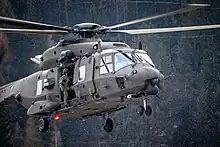
In June 2000, Italy signed an initial contract for a batch of 60 TTH (Tactical Transport Helicopter) for the Italian Army, along with a further 46 NFH (NATO Frigate Helicopter) and 10 TTH for the Italian Navy.[155] On 30 December 2007, the first NH90 TTH was formally handed over to the Italian Army.[156] On 23 June 2011, the navy received its first NH90, which was delivered to an interim MOC (Meaningful Operational Capability) standard, capable of performing training, search and rescue, and utility operations; anti-submarine and anti-surface warfare capabilities were not initially available until aircraft are retrofitted to a FOC (Final Operational Capability) standard.[157] In May 2013, the Italian Army took delivery of the first NH90 TTH of a FOC standard;[158] in November 2013, the Italian Navy took delivery of its first FOC-standard NH90 NFH.[159] The Italian NH90 fleet uses the GE T700-T6E1 turbine engine.[160] Italian NH90s are used for the following tasks tactical troop transport according NHI as reported by HeliHub news: logistics support, special operations, cargo resupply and hoisting, medical evacuations, light vehicle transport, disaster relief, and emergency response operations.[161]
In 2012, Italy deployed a total of 5 Army NH90 TTHs to support troops participating in the International Security Assistance Force in Afghanistan.[162] The NH90s, which were air-transported individually by allied Boeing C-17 Globemaster III cargo aircraft, replaced six Agusta/Bell 205s in performing tactical transport and medevac operations; Army Aviation Commander Gen. Enzo Stefanini stated that "…in Afghan conditions, the NH90 is delivering performance 15 percent above what was envisaged".[163] In December 2022, Italy received its 60th and final TTH (Transport version) from the Venice Tessera facility which opened in 2010 and delivered its first aircraft in 2011.[161]
In July 2023, a NH90 rolled over on its side during preflight checks at Taranto Grottaglie in Italy.[164] In October 2023, the Italian Navy received its 56th and final NH90 of the that order, also marking 35 000 hours with that fleet which it had its first delivery of in 2011.[165]
Netherlands
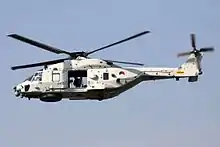
The Netherlands, one of the original supporters of the programme, ordered a total of 20 units, comprising 12 NFH and 8 TNFH for the Royal Netherlands Navy,[166][101][167][168] In 2010, the Royal Netherlands Navy became the first customer to receive the NFH variant.[169]
In 2009, concerns surfaced that design changes had made the helicopter too heavy to operate from Dutch frigates for which they were ordered.[170] In June 2014, the Dutch government decided not to accept the last batch of 7 NH90s due to some 100 shortcomings found in relation to the design, manufacturing and material choice of the aircraft, in particular corrosion in the presence of salt water.[171][172] In December 2014, NH90 deliveries restarted after the Dutch government came to an agreement with the manufacturer, under which modifications and necessary repairs against corrosion would be made at the manufacturer's cost; 75 of the 100 shortcomings were also reported as having been solved.[29][173]
In April 2013, the navy deployed the type onboard HNLMS De Ruyter to fight piracy in the Gulf of Aden.[174] In November 2014, the Royal Netherlands Navy deployed a single NH90NFH to Somalia to support Operation Atalanta in Somalia.[175]
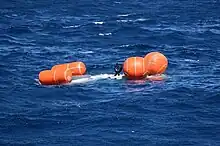
On 19 July 2020, a Royal Netherlands Navy NH90 helicopter crashed into water off the coast of Aruba near its home ship, killing two crew members and injuring two passengers. The Dutch Ministry of Defence launched an investigation, temporarily grounding all of the country's NH90s.[176] The cause of the crash was identified as a situation created when the helicopter made a turn which changed the relative speed of the air around it reducing the amount lift relative to the throttle, and it was also noted that the rescue efforts were hampered by high surf.[177] The situation for the crash was, "The investigation by the Dutch Safety Board reveals that the helicopter experienced difficulties when, after completing a turn, the aircraft found itself flying at the same speed as the wind, effectively suspended stationary in the air. In such a situation, a large amount of additional throttle is required to keep the helicopter airborne. Although the pilot applied extra throttle, the low flying altitude meant there was insufficient time to correct the already initiated descent."[177] When it hit the water, the emergency flotation system deployed which kept the helicopter from sinking, aiding the in the rescue attempts; as it was the two in the cockpit did not escape, and two passengers got and were recovered. The wreck eventually sank but divers were able to locate and get the black box (flight data recorder).[178] This incident has been studied for the cause of crash, but also various aspects such as they the crew escape and safety aspects, flight training, and rescue response.[179]
New Zealand
In July 2006, the New Zealand government signed a NZ$771 million (~€500M) contract to purchase eight NH90s (plus one extra for spares) to replace the Royal New Zealand Air Force's (RNZAF) fleet of 13 UH-1 Iroquois helicopters.[101][180] For ease of manufacture and logistics, New Zealand deliberately chose its NH90 configuration to be nearly identical to the larger Australian fleet.[181] On 7 December 2011, deliveries to New Zealand formally began with the first two NH90s being airlifted by a leased Antonov An-124 cargo aircraft to RNZAF Base Ohakea. In February 2013, the first phase of the RNZAF's operational evaluation of the NH90 was completed, clearing the type to begin operational duties.[181]
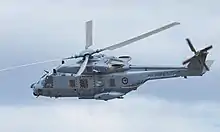
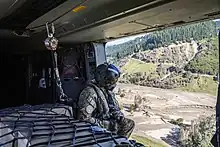
Between September 2013 and July 2014, the first four delivered NH90s were retrofitted to a final operational configuration; later aircraft were already delivered to this standard.[182] On 31 October 2014, the RNZAF announced that they had received into service the last of the eight NH90 TTHs.[181] Following command structure changes in December 2014, the NH90 fleet was tasked with additional responsibilities, including casualty evacuation during search and rescue operations and providing transport services to the New Zealand Police and other government personnel.[183] In April 2015, Defence Minister Gerry Brownlee questioned the inability of the NH90 fleet to contribute to relief efforts in the aftermath of Cyclone Pam, revealing that the fleet may be refitted with an automated blade and tail folding system to better enable ship borne deployments in the future.[184]
In April 2016, NH90s flew 160 hours during relief missions in Fiji following the devastation of Cyclone Winston, and in transported variety of staff to different locations. The NH90 served alongside the NZ Seaprites, and with additional logistical support from fixed wing aircraft.[185]
After the Kaikōura earthquakes in November 2016, the NH90s were critical in delivering aid and supplies to the area. They also assisted with civilian evacuations of foreign nationals.[186]
In April 2017, the RNZAF's NH90 fleet was grounded following an in-flight single engine failure which forced an emergency landing.[187]
In November 2021, New Zealand NH90, NZ3302, became the first of its type to reach 2,000 flying hours. According to the RNZAF, despite being delivered years after other customers, high serviceability rates allow New Zealand NH90s to fly more hours per aircraft than other operators.[188] New Zealand states it was getting acceptable flight hours from its fleet and was not going to change its maintenance regime.[189]
Norway
In 2001, Norway ordered 14 NH90 helicopters for use by the Royal Norwegian Navy and Norwegian Coast Guard, to be delivered in 2005–2008.[190] This decision was done a group as part of the Nordic Standard Helicopter program along with Sweden and Finland.[53] In December 2011, the first helicopter was delivered.[191] In July 2012, the Norwegian Deputy Defence Minister Roger Ingebrigtsen announced that "once our current Westland Lynx helicopters reach their end of life in 2014, we are going to have replacement helicopters on our naval vessels. If the NH90 hasn't been delivered, we will purchase another helicopter ... considering that the aircraft were to be delivered by 2005, and that delivery is yet to start by 2012, our confidence in the producer isn't exactly on the rise"[192] In August 2012 it was reported that the Royal Norwegian Air Force would be recommending that the Ministry of Defence contact Sikorsky to verify whether versions of the H-60 Seahawk, specifically the MH-60R, would be a viable alternative to the NH-90 in the anti-submarine warfare (ASW) role. Defence Minister Espen Barth Eide stated "We still believe the marine version of the NH90 to be the optimal platform, and we hope to purchase it, but there are limits to our patience."[193] In January 2016, six of the 14 aircraft had been delivered.[194]
A February 2018 report by the Norwegian Armed Forces found that its fleet of NH90 helicopters offer insufficient flight hours for the intended roles. The report advised that all helicopters are converted to the anti-submarine warfare role as required by the Royal Norwegian Navy, as opposed to current plans which see 6 of the 14 helicopters in that role, and the rest configured for Norwegian Coast Guard duties. The Norwegian Ministry of Defence stated that it would consider the report's recommendations before making a decision on the matter.[195][196]
In September 2018, the Norwegian Armed Forces reversed course and released an updated study that affirms that under "certain conditions" the requirements for both the navy and coast guard can be met with the current order of 14 helicopters. The conditions specifically state good spare parts availability, sufficient aircraft for maintenance scheduling and a sufficient overhaul capacity. Norwegian Minister of Defence Frank Bakke-Jensen added that although the inauguration is challenging, the ministry holds on to the timeline in which phasing in will be completed by 2022.[197][198] In February 2022 the Norwegian Minister of Defense again threatened to terminate the NH90 contract due to great concerns regarding new delays and NHI not meeting contractual obligations, considering sourcing alternative helicopters.[199]
In June 2022, the Norwegian Minister of Defense Bjørn Arild Gram announced the Norwegian Defence Material Agency was given the task to terminate the NH90 contract due to NHI not meeting contractual obligations, and announced that the NH90 is taken out of operation with immediate effect.[200]
The Norwegian Minister of Defence Bjørn Arild Gram announced that the Lockheed Martin MH-60R Seahawk would replace the NH90 helicopter in 2023, which if goes as planned to lead a procurment of six in the late 2020s.[201]
Oman
.jpg.webp)
In July 2004, the Sultanate of Oman issued an order for a total of 20 NH90 TTHs for the Royal Air Force of Oman (RAFO). To cope with the extreme flight conditions of the Middle East, RAFO NH90s are equipped with enhanced power plants; the type is to replace the Agusta/Bell 205A and Agusta/Bell 212 used for tactical transport and search and rescue operations.[202] On 23 June 2010, the first two NH90 TTHs were delivered to the RAFO at Musana Air Base.[203] By July 2012, ten NH90s had been delivered to the RAFO; in Omani service, the NH90 has established an endurance record, flying 700 nautical miles (1,300 km; 810 mi) without refueling during a 5-hour 21 minute-long mission.[204]
Qatar
In 2014, Qatar announced that it would invest in NH90 helicopters for $2.76 billion.[205] A contract is expected to be signed in March 2018, during the Dimdex defence exhibition.[206] The signing happened on 14 March 2018, which finalised the purchase of 28 NH90 Helicopters in a deal that is worth 3 billion euros. The agreement includes 16 NH90s for tactical transport and 12 NH90s for naval purposes. The deal is supposed to help Qatar with modernizing her military helicopter fleet.[207][208][209] On 20 August 2018, Leonardo announced the contract with Qatar was made effective for a total sum of US$3.7 billion, covering the agreed upon number of helicopters, with an option with six more of each type.[211][212][213][214]
On December 23, 2020, the first flights for Qatari-bound NH90s were being conducted for general evaluation.[215]
Spain
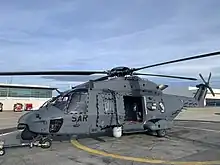
.jpg.webp)
On 20 May 2005 the Council of Ministers authorised the acquisition of 45 NH90 TTHs; in December 2006, it was announced that a procurement contract for the Spanish Armed Forces had been signed. The Spanish NH90 variant features domestically assembled General Electric CT7 8F5 engines, customised communications suite, and Indra-developed electronic warning systems.[216] The original budget for the procurement was for €1,260 million; by 2010, this had grown to €2,463M.[217] In June 2012, it was announced that Spain was negotiating to cut its purchase to 37 aircraft.[218] On 18 December 2014, Spain took delivery of the first NH90 TTH, which had been assembled at Airbus Helicopters Albacete facility; by this point, the order had been reduced to a total of 22 NH90s of the TTH variant.[219] Spain chose the GE CT7-85F turbine engine for its fleet.[220]
In January 2018, NHIndustries president Vincent Dubrule stated he was confident Spain would place a follow-on order by the end of 2018 for an additional 23 TTH NH90, bringing the total back up to 45.[206] In September 2018, the Spanish government agreed to the purchase of the additional 23 TTH NH90 helicopters, including seven for naval purposes.[221][222]
Sweden
.jpg.webp)
In 2001, Sweden signed a contract for 18 NH90 TTH, made up of 13 TTT[lower-roman 1]/SAR and 5 SAR/ASW to be operated by the Swedish Air Force.[223][224] This decision to order the NH90 was done a group as part of the Nordic Standard Helicopter program along with Norway and Finland; the Swede version has the High Cabin Variant (HCV).[53] Because of renewed foreign submarine activity at the Swedish coast in 2014 it was decided in 2015 that four TTT/SAR would be modified to SAR/ASW in order to increase the anti-submarine warfare capability, so there will be 9 TTT/SAR and 9 SAR/ASW.[225] The NH90 is known as the Helikopter 14 (HKP14) in Swedish service, the FOC version of TTT/SAR are designated HKP14E and the FOC version of SAR/ASW are designated HKP14F.[226]
By November 2015, Sweden had ordered 18 NH90s with ten helicopters delivered.[101] Sweden did not expect its NH90s to be operational until 2020 and ordered 15 UH-60M Black Hawks in 2011,[227] deploying four of its new Black Hawks to Afghanistan in March 2013.[228] In December 2015, the first Swedish NH90 in a full ASW configuration was delivered.[229][230] Sweden announced on 1 November 2022 that its NH90s will be replaced with S-70 (H-60) variants and an undetermined aircraft.[231]
Cancelled orders and failed order campaigns
- Portugal
Portugal was the fifth state to join the programme with an order for ten transport NH90 in June 2001; it was intended for these to equip the Portuguese Army Light Aviation Unit. However, in July 2012, fiscal consequences of the Great Recession led Portugal to cancel the order, despite having already spent €87m on the project, in order to save another €420m in acquisition and running costs to 2020.[232][233] Portugal had planned to order the TTH version for air mobility capability.[234]
- Saudi Arabia
In July 2006, the Saudi Government agreed to purchase 64 NH90s.[235] Then in October 2007 the government changed its plans, and agreed to buy 150 Russian-made Mi-35 and Mi-17 helicopters instead.[236]
- Egypt
In July 2015, the Egyptian Navy entered negotiations for the purchase of 5 NH90 NFH helicopters; these were intended to serve on board its newly acquired FREMM frigate Tahya Misr and 4 Gowind corvettes that were also on order. The NH90 helicopters would all be of French standard.[237][238] In October 2015, it was reported that negotiations for a "large quantity" of NH90s had reached an advanced stage.[239] In April 2019 it was announced that Egypt was ordering the AW149 and not the NH90.[240]
Variants
NFH: NATO Frigate Helicopter
.jpg.webp)
The primary role of the NFH version is autonomous ASW and anti-surface unit warfare (ASuW), mainly from naval ships. These aircraft are equipped for day and night, adverse weather and severe ship motion operations. Additional roles include anti-air warfare support, vertical replenishment (VERTREP), SAR and troop transport. France are splitting their purchase between the "NFH version combat" costing €43.3m in FY2013 and the "NFH version soutien" (support) at €36.4m in FY2013.[241]
One of the major differences of the NFH, is that it has a folding tail and rotors, and a stronger undercarriage suitable for marine landings.[242]
- SH-90A
- Italian Navy designation from 2012 for NH90 NFH.[243]
- NH90 NFH Caïman
- French Navy designation for NH90 NFH.[101][120]
- NH90 Sea Lion
- German Navy development of the French NH90 NFH. The Sea Lion features a reduced set of sensors as the main task is SAR and ship based Transport (VERTREP and Special Forces) and is usually unarmed (doorguns can be installed). First flight was on 8 December 2016 and service deliveries started in October 2019.[146][147]
- NH90 Sea Tiger
- Another German Navy development of the NFH90. The Sea Tiger will be the future helicopter for anti-submarine warfare (ASW) and anti-surface unit warfare. The first helicopters were ordered in 2019 with a potential total of up to 31.[244]
TTH: Tactical Transport Helicopter
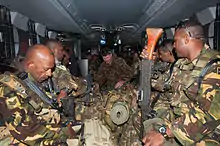

The primary role of the TTH version is the transport of 20 troops or more than 2,500 kg of cargo, heliborne operations and search & rescue. It can quickly be adapted to MEDEVAC/CASEVAC missions by fitting up to 12 stretchers or cargo delivery capability. Additional roles include special operations, electronic warfare, airborne command post, parachuting, VIP transport and flight training.
- Helikopter 14 (Hkp 14)[245]
- Swedish Armed Forces' designation of its eighteen NH90 TTH:[226] of the High Cabin Version (HCV), in which the cabin height is increased by 24 cm (9.4 in) to 1.82 m (6.0 ft) to allow it to be used for ambulance transports as the original height of 1.57 m (5.2 ft) did not comply with peacetime work safety regulations.[246] The fleet consists of nine ground operative helicopters, Hkp 14E, and nine helicopters for maritime use equipped with sonar and search radar for submarine hunting with the designation Hkp 14F.[245] The Swedish aircraft have a Tactical Mission System developed by SAAB[246][247] Finnish and Swedish TTHs are called Tactical Troop Transports (TTT) in some contexts.
- HT-29 Caimán
- Spanish Army designation for NH90 GSPA TTH.[248]
- MRH-90 Taipan
- Australian Defence Force designation for NH90 TTH.
- NH90 TTH Caïman
- French Army designation for NH90 TTH.[101][120]
- UH-90A
- Italian Army designation for the NH90 TTH.[243]
- MH-90A
- Italian Navy variant of the NH90 TTH.[249]
MTT: Maritime Tactical Transport
The MTT is a blend between the TTH and NFH, combining the land-based configuration of the TTH with specialized maritime features of the NFH, including folding rotorblades, a tail-boom, and a strengthened undercarriage. The variant was first announced in February 2019 and has reportedly piqued interest from the Spanish and Italian armed forces who may order this variant as part of existing orders.[250]
Operators
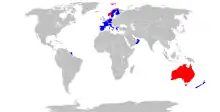
|
Current NH90 operators Former NH90 operators |
.png.webp)
.jpg.webp)
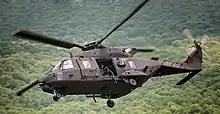
- Belgian Air Component;[251] 8 in service, four TTHs flown for Belgian Army will be phased out in 2025.
- Italian Army[251]
- Italian Navy[251] (56 total fleet by 2023)[165]
- Defence Force Helicopter Wing;[251] 18 NH90 HCV (High Cabin Version)
Former operators
- Australian Army; withdrawn from service in 2023.[97] 47 TTH were in service.
- Royal Australian Navy; withdrawn from service in 2022.[83]
- Royal Norwegian Air Force; The Ministry of Defense announced its NH90s are phased out from service as of June 2022.[253] NFH version
Accidents
From 2008 there have been reports at least 11 significant accidents with NH90 of various types.[254]
- In 2008, an Italian NH90 crashed into Lake Bracciano attempting a Fiesler maneuver during a show.[255][256]
- In April 2010, an ADF (Australian) MRH90 suffered a single engine failure near Adelaide, landing safely at RAAF Base Edinburgh[67] In May the Australian MRH90 fleet was grounded due to engine issues since the April incident.[68] The cause of the failure was determined as the compressor blade contacting the engine casing. The response was the aircraft would require new preventative inspections, and flights resumed in July 2010.[69] One reason implicated in the engine failure was complications relating to an inflight restart of the engine (hot start).[47]
- In December 2017, an Oman NH90 crashed during a training exercise with 1 loss of life.[257][254]
- In August 2018, a French NH90 had an engine fire and an emergency landing in field was performed with no loss of life.[258]
- In July 2020, a Dutch NH90 crashed near Aruba in the Caribbean on exercises with the loss of two Naval officers.[259]
- In March 2023, an Australian MRH90 with ten aboard experienced an engine failure and ditched in Jervis Bay with everyone surviving. The helicopter's flotation system was deployed, allowing it to float, and it was towed onto a nearby beach.[47]
- In July 2023, an Australian MRH90 crashed at night during Exercise Talisman Sabre off the coast of Hamilton Island, Queensland, with the loss of its four crew.[92][93][94] Parts of the airframe and human remains were found in a debris field in 40 meters of water, consistent with a catastrophic impact. The cause of the crash is under investigation as of late 2023.[91]
Specifications (NH90)
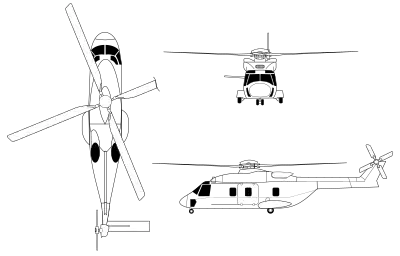
Data from AgustaWestland,[41] Airbus Helicopters,[42] The International Directory of Military Aircraft, 2002/2003[260]
General characteristics
- Crew: 2 flight crew + loadmaster / sensor operator
- Capacity: 20 seated troops; or 12 medevac stretchers; or 2 NATO pallets; or 4,200 kg (9,259 lb) external slung load
- Length: 16.13 m (52 ft 11 in)
- Empty weight: 6,400 kg (14,110 lb)
- Max takeoff weight: 10,600 kg (23,369 lb)
- Powerplant: 2 × General Electric CT7-8E turboshaft engines, 1,845 kW (2,474 hp) each (option)
- Powerplant: 2 × Rolls-Royce Turbomeca RTM322-1/9 turboshaft engines, 1,802 kW (2,417 hp) each (option)
- Main rotor diameter: 16.3 m (53 ft 6 in)
- Main rotor area: 208.699 m2 (2,246.42 sq ft) root: ONERA OA312; tip: ONERA OA409/OA407[261]
Performance
- Maximum speed: 300 km/h (190 mph, 160 kn)
- Range: 800 km (500 mi, 430 nmi) TTH
- 1,000 km (620 mi; 540 nmi) NFH
- Endurance: 5 hours
- Service ceiling: 6,000 m (20,000 ft)
- Rate of climb: 8 m/s (1,600 ft/min)
Armament
- Guns: 2 door guns
- Missiles: anti-submarine and/or air to surface missiles (NFH version)
See also
Aircraft of comparable role, configuration, and era
- AgustaWestland AW149
- AgustaWestland AW159 Wildcat
- Airbus Helicopters H175
- Bell 525 Relentless
- Eurocopter EC 725
- Eurocopter AS532 Cougar
- Harbin Z-20
- Mil Mi-38
- Sikorsky MH-60R Seahawk
- Sikorsky CH-148 Cyclone
- Sikorsky UH-60 Black Hawk
Notes
- Tactical Troop Transport
References
- Sgarlato, Nico (April 2008). "Gli NH-90 dell'Esercito". Aeronautica & Difesa (in Italian).
- "NH Industries". Retrieved 19 June 2022.
- Perry, Dominic. "Rotor club: Our top 10 most influential helicopters." Archived 2014-11-24 at the Wayback Machine Flight International, Flight Global, 21 November 2014.
- Perry, Dominic."Australia plans early retirement for NH90 helicopters as it lines up Black Hawk order." Helicopters, Flight Global, 10 December 2021.
- Frawley, Gerard. "NHIndustries NH 90". The International Directory of Military Aircraft, 2002/2003. Aerospace Publications, 2002. ISBN 1-875671-55-2.
- "NAHEMA". NATO. 19 January 2007. Archived from the original on 21 February 2013. Retrieved 3 June 2012.
- "NH90 Helicopter – 3rd Prototype in Flight" (Press release). Eurocopter. 27 November 1998. Archived from the original on 22 January 2013. Retrieved 3 June 2012.
- MacKenzie, Christina. "NH90 prototype takes off with fly-by-wire controls." Archived 2014-12-20 at the Wayback Machine Flight International, 5 January 2004. p. 15.
- Hoyle, Craig. "IN FOCUS: NH90 Caiman cuts teeth with French navy." Archived 2014-12-09 at the Wayback Machine Flight International, 19 June 2013.
- "Aircraft profile: NH Industries NH90". Flightglobal.com. Archived from the original on 19 April 2014. Retrieved 3 June 2012.
- "Germany, Italy, France, Netherlands Place $8.6 Billion Order for NH-90". Defense Daily. 9 June 2000. Archived from the original on 24 September 2015. Retrieved 6 August 2015.
- Tran, Pierre (8 April 2013). "Eurocopter: Dropping NH90 Order Would Hurt France, Firm". Defense News. Archived from the original on 29 June 2013.
- "NHIndustries delivers 500th NH90 helicopter". Janes.com. Retrieved 23 October 2023.
- "News Breaks", Aviation Week & Space Technology, 1 January 2007.
- "Spain performs its maiden flight of NH 90". Eurocopter. Archived from the original on 22 January 2013. Retrieved 3 April 2013.
- "The Company". NH Industries. Archived from the original on 23 June 2013. Retrieved 15 November 2014.
- "First Delivery." Archived 2016-08-26 at the Wayback Machine Rotor Online, Airbus helicopters, December 2006.
- "First Dutch NH90 NFH delivered". Australian Aviation. Archived from the original on 9 October 2011. Retrieved 30 November 2010.
- Perry, Dominic. "NH Industries plans 'simplified' NH90 for future customers." Archived 2014-07-17 at the Wayback Machine Flight International, 25 June 2014.
- Lert, Frédéric and Charles Forrester. "NH90 production winds down globally." Archived 2016-01-20 at the Wayback Machine IHS Jane's Defence Weekly, 17 January 2016.
- "250th NH90 helicopter delivered." Archived 2016-02-06 at the Wayback Machine Rotor hub, Shepard Media, 16 October 2015.
- correspondent, Ian Goold • Senior. "Eurocopter cool on civil NH90 | AIN". Aviation International News. Retrieved 23 October 2023.
- Bundeswehr NATO-Hubschrauber NH90: Modernster Helikopter der Welt hat viele Mängel – Politik Archived 2010-02-24 at the Wayback Machine. Bild.
- "Bundeswehr". Tagesschau. Archived from the original on 26 February 2010.
- Minister for Defence and Minister for Defence Materiel (28 November 2011). "Projects of Concern Update" (Press release). Department of Defence (Australia). Archived from the original on 27 January 2012. Retrieved 11 January 2012.
- "MRH90 recommencement of flying operations" (Press release). Department of Defence (Australia). 22 July 2010. Archived from the original on 8 May 2012. Retrieved 11 January 2012.
- Perrett, Bradley (10 January 2012). "Australian NH90 Delayed Further". Aerospace Daily and Defence Report. Retrieved 11 January 2012 – via Aviation Week.
- Gravemaker, Anno (19 March 2014). "Dutch maritime NH90s suffer corrosion". Flightglobal. Reed Business Information. Archived from the original on 19 April 2014. Retrieved 19 March 2014.
- Perry, Dominic. "Dutch NH90 deliveries to resume." Archived 2014-12-16 at the Wayback Machine Flight global, 16 December 2014.
- "RNZAF's NH90s Unreliable Money Guzzlers". scoop.co.nz
- "Skenande kostnader för försvarets nya helikoptrar" [Rising costs for the defence's new helicopters]. Aftonbladet (in Swedish). Archived from the original on 29 May 2018.
- Benigh, Love; Horvatovic, Iva (8 February 2018), "Forsvarets helikopter dyr att flyga", SVT (in Swedish), archived from the original on 8 February 2018.
- "Minister struntade i expertråd vid helikopterköp". 17 August 2011 – via sverigesradio.se.
- "Skyhöga kostnader för att flyga hkp 14". 8 February 2018.
- Frisk, Corporal (3 March 2018). "Of Helicopters and High Costs".
- Times, The Brussels. "Defence ministry cuts helicopter flights in half over costs". www.brusselstimes.com.
- corporateName=Commonwealth Parliament; address=Parliament House, Canberra. "MRH-90 Taipan helicopter: a quick guide". www.aph.gov.au.
{{cite web}}: CS1 maint: multiple names: authors list (link) - Perry2022-11-15T10:52:00+00:00, Dominic. "Why new NH Industries chief is upbeat, despite Swedish setback". Flight Global.
- "Requirements Basis." Archived 2014-12-01 at the Wayback Machine NHI Industries, Retrieved: 20 December 2014.
- Moxon, Julian. design "Wired into the Future." Archived 2014-12-21 at the Wayback Machine Flight International, 8 September 1998.
- "NH 90". Products. AgustaWestland. Archived from the original on 14 February 2015. Retrieved 11 August 2019.
- "NH90." Archived 2016-03-05 at the Wayback Machine Airbus Helicopters, Retrieved: 9 January 2016.
- "Designs for RTM322 variant at 'advanced stage'." Archived 2014-12-21 at the Wayback Machine Flight International, 13 October 2003.
- "On board the NH90." Archived 2015-12-24 at the Wayback Machine Thales Group, Retrieved: 20 December 2014.
- "First Finmeccanica – Selex ES anti-collision laser system operational on Italian Army NH90 TTH helicopter." Archived 2016-02-01 at the Wayback Machine Finmeccanica, 16 October 2015.
- "Salvaging of the NH90 has started". Future Force (in Dutch). 28 August 2020. Retrieved 30 October 2020.
- Bergmann, Kym (17 April 2023). "Taipan probably ditched because Army didn't update software". APDR. Retrieved 18 October 2023.
- www.airbus.com https://www.airbus.com/en/newsroom/press-releases/2020-10-france-signs-contract-for-upgraded-nh90-tth-for-special-forces. Retrieved 25 October 2023.
{{cite web}}: Missing or empty|title=(help) - Centeno, Gabriel (2 October 2023). "Australia retires 40 NH-90 helicopters early". Aeroflap. Retrieved 16 October 2023.
- Centeno, Gabriel (5 November 2022). "Sweden wants to replace its NH90 helicopters with the UH-60 Black Hawk". Aeroflap. Retrieved 16 October 2023.
- Perry2023-10-06T09:35:00+01:00, Dominic. "NHI chief dismisses NH90 safety fears in wake of Australian decision, as dialogue with Sweden continues". Flight Global. Retrieved 16 October 2023.
- Gain, Nathan (6 September 2022). "The STAR Plan: New Capabilities in Sight for the Belgian Navy". Naval News. Retrieved 23 October 2023.
- "NH90 NFH Nato Frigate Helicopter". Airforce Technology. Retrieved 23 October 2023.
- www.airbus.com https://www.airbus.com/en/newsroom/news/2021-04-nh90-a-transformation-plan-for-customer-support. Retrieved 23 October 2023.
{{cite web}}: Missing or empty|title=(help) - "ParlInfo - New helicopters for Army". parlinfo.aph.gov.au. Retrieved 29 September 2023.
- "34 NH90 Additional Helicopters for Australia". NH Industries. Archived from the original on 5 January 2014. Retrieved 3 April 2013.
- "Defence to spend $2b more on choppers". The Sydney Morning Herald. 19 June 2006. Archived from the original on 8 October 2006. Retrieved 19 June 2006.
- "Australian Government Orders 12 NH90 Helicopters". 6 February 2005. Archived from the original on 27 November 2006. Retrieved 25 October 2006.
- "Australia Gets first NH 90". NH industries. 18 December 2007. Archived from the original on 1 February 2014. Retrieved 3 April 2013.
- "NH90 NFH Nato Frigate Helicopter". Airforce Technology. Retrieved 16 October 2023.
- "Navy commissions 808 Squadron and new helicopter". Department of Defence. Archived from the original on 14 July 2013. Retrieved 13 July 2013.
- corporateName=Commonwealth Parliament; address=Parliament House, Canberra. "MRH-90 Taipan helicopter: a quick guide". www.aph.gov.au. Retrieved 19 October 2023.
{{cite web}}: CS1 maint: multiple names: authors list (link) - Farrell, John Hunter (3 October 2023). "Australia's NH90 Helicopter Nightmare Is Finally Ending". The Drive. Retrieved 17 October 2023.
- "Why has Defence grounded its MRH 90s? - Australian Defence Magazine". www.australiandefence.com.au. Retrieved 19 October 2023.
- OuinetAdmin (19 March 2007). "Turbomeca Wins Aussie Order for RTM 322 Turboshaft". Defense aerospace. Retrieved 19 October 2023.
- Defence grounds choppers after engine malfunction Archived 2010-05-21 at the Wayback Machine. ABC (Australian Broadcasting Corporation) News
- Defence grounds new chopper fleet Archived 2010-05-22 at the Wayback Machine. ABC (Australian Broadcasting Corporation) News
- Francis, Leithen (28 July 2010). "Australia finds MRH90 engine failure due to compressor blade fracture". Flightglobal. Archived from the original on 19 April 2013. Retrieved 8 June 2013.
- Gunner, Jerry. "MH-60R beats NH90 for Australia Navy contract" Archived 2012-03-14 at the Wayback Machine. Key Aero Aviation News, 17 June 2011.
- Australian auditors slam bungled NH90 procurement Archived 2014-07-29 at the Wayback Machine, Flight global, 29 July 2014
- "MRH90 helicopter Project of Concern progress". Department of Defence. Minister for Defence & Minister for Defence Materiel. 9 May 2013. Archived from the original on 26 December 2015. Retrieved 26 December 2015.
- Perrett, Bradley. "Airbus Fixing Remaining Australian NH90 Faults." Archived 2016-10-26 at the Wayback Machine Aviation Week, 18 September 2015.
- "Australian Navy completes MRH90 multi-role helicopter trials". Naval Today. 20 June 2017. Archived from the original on 21 June 2017. Retrieved 21 June 2017.
- Kerr, Julian (1 February 2016). "Air: MRH90 Taipan – reaching for 2016 milestones". Australian Defence Magazine. Retrieved 17 December 2020.
- "Multi-Role Helicopter Project Data Summary Sheet". 2019–20 Major Projects Report - Department of Defence (PDF). 2020. ISBN 978-1-76033606-6. ANAO Report No.19 2020–21. Retrieved 18 December 2020.
{{cite book}}:|work=ignored (help) - "Additional Estimates – 4 March 2020 - Question 84 - MRH90 design - Senator Kitching". Department of Defence. Senate Standing Committee Foreign Affairs, Defence and Trade. 21 April 2020. Archived from the original on 18 December 2020. Retrieved 17 December 2020.
- Tillett, Andrew (27 October 2020). "Army helicopter's gun failings leave special forces vulnerable". Australian Financial Review. Retrieved 17 December 2020.
- Jennings, Gareth (6 February 2019). "Australia begins SOF helo transition from Black Hawk to MRH90". Janes. Retrieved 17 December 2020.
- "Defence grounds troubled MRH-90 Taipan helicopter fleet over safety concerns". ABC News. 17 June 2021.
- Minister for Defence Peter Dutton (10 December 2021). "Strengthening Army's helicopter capability". Department of Defence Ministers (Press release). Retrieved 1 September 2022.
- McLaughlin, Andrew (10 December 2021). "With a new Black Hawk on the way, the original is retired". Australian Defence Business Review. Retrieved 18 January 2022.
- Hurst, Daniel (9 November 2022). "Australia pays to maintain trouble-plagued Taipan helicopters no longer being used by navy". The Guardian. Retrieved 22 March 2023.
- Department of Defence (2022). Portfolio Budget Statements October 2022-23 - Defence Portfolio (PDF). Canberra: Commonwealth of Australia. p. 57. ISBN 9781925890587. Retrieved 22 March 2023.
- Prime Minister Scott Morrison; Minister for Defence Peter Dutton; Minister for Defence Industry, Minister for Science and Technology Melissa Price (9 May 2022). "Securing our national security and local defence jobs and skills". Liberal Party of Australia (Press release). Archived from the original on 9 May 2022. Retrieved 1 September 2022.
- "Govt outlines Navy helicopter fleet plans". Australian Defence Business Review. 9 May 2022. Retrieved 1 September 2022.
- Navy, corporateName=Royal Australian. "MH-60R Seahawk". www.navy.gov.au. Retrieved 19 October 2023.
- Williams, Claudia; Bevan, Matt; Fernandez, Tim; McLean, Charlie (23 March 2023). "ADF to investigate after MRH-90 Taipan helicopter ditches near Jervis Bay". Australian Broadcasting Corporation. Archived from the original on 27 July 2023. Retrieved 29 July 2023.
- Sharwood, Simon. "Military helicopter crash blamed on missing software patch". www.theregister.com. Retrieved 16 October 2023.
- Knott, Matthew (30 July 2023). "Troubled Taipans expected to fly again after crash: army chief". The Sydney Morning Herald. Retrieved 16 October 2023.
- Hurst, Daniel (3 August 2023). "Taipan army helicopter crash: human remains and cockpit debris found after Queensland search". The Guardian. ISSN 0261-3077. Retrieved 16 October 2023.
- "Four crew of Australian Army chopper missing after crash in Queensland's Whitsundays amid joint military exercise with US Marines". Australian Broadcasting Corporation. 29 July 2023. Archived from the original on 28 July 2023. Retrieved 29 July 2023.
- Dziedzic, Stephen; Quattrocelli, Peter (28 July 2023). "Four crew missing after Australian Army chopper crashes off northern Queensland coast amid joint military exercise with US". ABC News. Retrieved 29 July 2023.
- "Helicopter crash puts key Australia-US war games on hold". Reuters. 29 July 2023. Retrieved 29 July 2023.
- "Australia Recovers MRH-90 Flight Data Recorder, NZ Resumes NH90 Ops | Aviation Week Network". aviationweek.com. Retrieved 19 October 2023.
- Roberts, Georgia (29 September 2023). "Australian Defence Force MRH-90 Taipan helicopters involved in Whistsundays crash retired early". ABC News. Retrieved 29 September 2023.
- "Army helicopter fleet update" (Press release). Australian Department of Defence. 29 September 2023. Retrieved 29 September 2023.
- Farrell, John Hunter (3 October 2023). "Australia's NH90 Helicopter Nightmare Is Finally Ending". The Drive. Retrieved 16 October 2023.
- "Nahema signs contract for 10 NH90 helicopters for Belgium". 19 July 2007. Archived from the original on 13 November 2007. Retrieved 12 September 2007.
- "First flight of the belgian nh90". nhindustries. Archived from the original on 26 April 2014. Retrieved 3 April 2013.
- "World Air Forces 2013" (PDF). Flightglobal Insight. 2013. Archived (PDF) from the original on 2 November 2013.
- "Belgium Receives its First NH90 NFH Naval Helicopter." Archived 2013-08-10 at the Wayback Machine Deagel, 1 August 2013.
- "Belgium Receives Last NH90 Troop Transport Helicopter." Archived 2014-11-29 at the Wayback Machine Aviation Week, 17 November 2014.
- Jennings, Gareth (23 August 2015). "Belgium declares IOC for naval NH90 helo". IHS Jane's Defence Weekly. Archived from the original on 26 December 2015. Retrieved 26 December 2015.
- Fiorenza, Nicholas. "Belgian NH90 Helicopter Conducts First Rescue Mission." Archived 2015-12-30 at the Wayback Machine Aviation Week, 31 August 2015.
- "Legerhelikopters na amper 6 jaar aan de ketting te weinig inzetbaar en te duur". HLN. DPG Media Privacy Gate.
- "Helikopters BE". Helispot.
- Herk, Hans van (27 February 2023). "Belgian Armed Forces NH90-TTH replacement". www.scramble.nl. Retrieved 23 October 2023.
- "Finland signs the contract for 20 NH90 helicopters". NH industries. Archived from the original on 12 September 2012. Retrieved 3 April 2013.
- "Finnish Army Aviation Takes Delivery of Its First NH90". NH Industries. Archived from the original on 12 September 2012. Retrieved 20 January 2013.
- "Finland Receives Suila’s NH90 Program Lessons Report." Archived 2014-12-20 at the Wayback Machine Defense Industry Daily, 5 March 2008.
- Suila, Keijo. "Finland’s Helicopter Programme." Archived 2014-07-27 at the Wayback Machine Defmin, March 2008.
- "Finnish NH90 helicopters to receive Patria ballistic protection." Archived 2014-12-20 at the Wayback Machine Patria, 1 September 2011.
- Chéry, Stéphane. "Finnish NH90 helicopters demonstrate their operational capabilities: More than 150 soldiers are airlifted over a 320 km. distance in five hours." Archived 2014-12-20 at the Wayback Machine Airbus Helicopters, 21 June 2011.
- "Finnish NH90s creep towards 50% operational serviceability rate". Flight global. Reed Business Information. 24 January 2015. Archived from the original on 28 January 2015. Retrieved 24 January 2015.
- Stevenson, Beth (23 January 2015), "Finnish NH90s creep towards 50% operational serviceability rate", Flightglobal, Reed Business Information, archived from the original on 28 January 2015, retrieved 26 January 2015
- "Maavoimat vastaanotti vuosien odottelun jälkeen viimeisen NH90-kopterin". Iltalehti. 18 June 2015. Archived from the original on 19 June 2015. Retrieved 19 June 2015.
- Simola, Anita (9 November 2015). "Puolustusministeri Niinistö: Maavoimien helikoptereiden hankkiminen oli virhe". Aamulehti. Archived from the original on 14 November 2016. Retrieved 13 November 2016.
- "Hélicoptère Caïman Marine". French Navy. Archived from the original on 12 July 2012. Retrieved 24 October 2012.
- "Le NH90 français s'appellera Caïman". Mer et Marine. 14 June 2010. Archived from the original on 29 September 2011. Retrieved 14 June 2010.
- "France says orders 34 NH90 helicopters from NHIndustries." Archived 2015-10-19 at the Wayback Machine Reuters, 29 May 2013.
- Svitak, Amy. "France Orders Six Additional NH90 Helicopters." Archived 2016-09-19 at the Wayback Machine Aviation Week, 7 January 2016.
- "French Army receive first NH90TTH helicopters". Lignes de défense. Ouest France. Archived from the original on 25 April 2012. Retrieved 1 July 2011.
- http://www.nhindustries.com/website/en/press/THE-NH90-CAIMAN-RESCUES-19-PEOPLE-AT-NIGHT-IN-STORMY-WEATHER_138.html
- "NH90: Eurocopter celebrates two firsts with Belgium and France". Archived from the original on 22 January 2013. Retrieved 15 November 2014.
- "Lorient : Le départ de la frégate Lorraine en images | Mer et Marine". 4 November 2022.
- Lert, Frédéric. "France deploys NH90 to Mali". Jane's. Defence Weekly. Archived from the original on 10 November 2014. Retrieved 15 November 2014.
- "France signs contract for upgraded NH90 TTH for Special Forces" (Press release). Airbus. 12 October 2020.
- Mackenzie, Christina (12 October 2020). "France orders beefed-up NH90 choppers for special operations". Defense News. Retrieved 17 December 2020.
- "France prepares NH90 Special Forces variant". Air & Cosmos International. 8 October 2018. Retrieved 17 December 2020.
- Langfield, Mandy. "NH90 rescue report – plucked from stormy waters". AirMed&Rescue. Retrieved 23 October 2023.
- "Caimans come of age". Vertical Mag. Retrieved 23 October 2023.
- "French armed forces wave goodbye to the Alouette". Vertical Mag. 13 January 2023. Retrieved 23 October 2023.
- "Germany Receives its First Batch of NH90". NHIndustries. 13 December 2006. Archived from the original on 16 January 2014. Retrieved 18 February 2017.
- "German Navy to decide soon on its new Maritime Helicopter". Defpro. 20 March 2009. Archived from the original on 24 March 2009.
- "Germany finalises cuts to NH90, Tiger helicopter orders". Archived from the original on 21 April 2014. Retrieved 19 March 2013.
- "Ausschuss stoppt de Maizières Hubschrauber-Deal". Der Spiegel. 26 June 2013.
- Perry, Dominic. "Germany proposes 'shared' multinational NH90 helicopter fleet." Archived 2014-12-09 at the Wayback Machine Flight International, 1 December 2014.
- "NH90: Europe’s Medium Helicopter Now Available for NATO Pooling." Archived 2014-10-12 at the Wayback Machine Defense Industry Daily, 2 December 2014.
- "Germany’s Bundeswehr Reaches the 5,000 Flight-Hour Milestone With Its NH90 Fleet." Archived 2014-12-20 at the Wayback Machine Eurocopter, September 2012.
- "Afghanistan: Tiger und NH90 leisten ihren Beitrag". Bundeswehr. Archived from the original on 7 November 2014. Retrieved 15 November 2014.
- German NH90s Operational In Medevac Role, Aviation week, 25 June 2013
- Kucera, Joshua. "Helicopter Crash Complicates Germany-Uzbekistan Base Negotiations." Archived 2014-12-02 at the Wayback Machine Eurasianet, 28 October 2014.
- Jennings, Gareth. "Germany begins NH90 Sea Lion production, retrofits for TTH variant." Archived 2016-01-04 at the Wayback Machine IHS Jane's Defence Weekly, 1 December 2015.
- Perry, Dominic. "Germany still pushing multinational NH90 medevac fleet." Archived 2016-02-07 at the Wayback Machine Flight International, 20 January 2016.
- "German Navy NH90 Sea Lion performs maiden flight" (Press release). Airbus Helicopters. 8 December 2016. Archived from the original on 9 December 2016. Retrieved 8 December 2016.
- "German Navy's NH90 Sea Lion Helicopter Achieves Maiden Flight". Defense World. 8 December 2016. Archived from the original on 9 December 2016. Retrieved 8 December 2016.
- "NH90 Sea Lion helicopter progresses towards 2019 delivery to German Navy". Naval Today. 23 November 2018. Archived from the original on 26 November 2018. Retrieved 26 November 2018.
- "Bundeswehr verzichtet vorerst auf neuen Marinehubschrauber". Spiegel Online. Retrieved 27 November 2018.
- Gain, Nathan (23 November 2020). "Germany cleared €2.7 Bn deal for 31 NH90 Sea Tiger ASW helicopters". Naval News. Retrieved 29 November 2020.
- "Greece Signs the Contract for 20 NH90 Helicopters Plus 14 in Option". NH Industries, 1 September 2003.
- "Airbus Helicopters rejects bribery allegations in Greek NH-90 deal." Archived 2015-10-19 at the Wayback Machine Reuters, 23 March 2015.
- "Προσγειώθηκε στα Μέγαρα το 11ο ελικόπτερο ΝΗ-90 TGRA της Αεροπορίας Στρατού". Via Diplomacy. 20 December 2014. Archived from the original on 14 August 2016. Retrieved 19 July 2016.
- "Γιατί έπεσε το ελικόπτερο ΧΙΟΥΙ". Militarie.
- "Four European Nations give NH-90 Production Go-ahead". NH industries. Archived from the original on 10 September 2012. Retrieved 3 April 2013.
- Hoyle, Craig. "PICTURE: Italian army receives first NH90 transport helicopter." Archived 2014-12-20 at the Wayback Machine Flight International, 9 January 2008.
- Peruzzi, Luca. "PARIS: Italy receives first naval NH90 helicopter." Archived 2014-12-20 at the Wayback Machine Flight International, 23 June 2011.
- "Italian Army Takes Delivery of Its First NH90 TTH Helicopter in FOC Configuration." Archived 2014-12-18 at the Wayback Machine AgustaWestland, 2 May 2013.
- "Italian Navy Receives First NH90 NFH in FOC." Archived 2014-12-20 at the Wayback Machine AgustaWestland, 11 November 2013.
- "GE T700-T6E1 Powers NH90 Helicopter | GE Aerospace". www.geaerospace.com. Retrieved 21 October 2023.
- Wilson, Gwen (6 December 2022). "Italian Army receives last NH90 TTH". HeliHub.com. Retrieved 23 October 2023.
- Niels Hillebrand. "Italian Army NH90 in Afghanistan: one year and 1000 flight hours". Milavia. Archived from the original on 7 November 2014. Retrieved 15 November 2014.
- Kington, Tom. "Plagued by Delays, NH90 Helos Head to Afghanistan Air Base." Defense News, 4 September 2012.
- "Accident NHIndustries SH-90A MM81...,". aviation-safety.net. Retrieved 19 October 2023.
- Cenciotti, Stefano D'Urso, David (6 October 2023). "Italian Navy Receives Final NH90 Helicopter". The Aviationist. Retrieved 19 October 2023.
{{cite web}}: CS1 maint: multiple names: authors list (link) - "First Flight of Royal Netherlands Navy NH90 NFH". NHIndustries. 10 August 2007. Archived from the original on 14 March 2008.
- "NH90 vliegt voor het eerst 's nachts met nachtzichtapparatuur". Archived from the original on 29 November 2014. Retrieved 15 November 2014.
- AirForces Monthly December 2013 pages 48-54
- "The Royal Netherlands Navy Takes Delivery of Its First NH90 NFH". Helis. 21 April 2010. Archived from the original on 15 October 2012. Retrieved 12 January 2013.
- "Nieuwe NH-90 helikopter te zwaar voor fregatten". Volkskrant. Archived from the original on 13 June 2009. Retrieved 10 June 2009.
- "Defensie schort afname NH90 helikopters op". Volkskrant. 27 June 2014. Archived from the original on 30 June 2014. Retrieved 30 June 2014.
- "Corrosion issue halts Dutch NH90 deliveries". Flight Global. Reed Business Information. Archived from the original on 26 October 2014. Retrieved 15 November 2014.
- "Kamer: schade NH90 verhalen". NOS. 2 July 2014. Archived from the original on 7 November 2014. Retrieved 15 November 2014.
- "The Netherlands deploys NH90 for the first time". shephardmedia.com. Archived from the original on 22 January 2014. Retrieved 3 April 2013.
- "Royal Netherlands Navy NH90 NFH Helicopter first operational deployment for Somalia Mission". Archived from the original on 6 November 2014. Retrieved 15 November 2014.
- "NH90-helikopter Defensie neergestort bij Aruba: twee doden". Telegraaf. Archived from the original on 20 July 2020. Retrieved 20 July 2020.
- "Cause of NH90 crash known, further investigation still needed". Onderzoeksraad. Retrieved 21 October 2023.
- "Dutch NH90 lost lift after downwind turn, causing crash that killed two". Vertical Mag. 13 December 2020. Retrieved 21 October 2023.
- Aerossurance (19 December 2021). "Dutch Maritime NH90 Caribbean Accident: Focus on the Survivability Issues". Aerossurance. Retrieved 23 October 2023.
- Coleman, Jonathan (9 March 2012). "New NH90 Helicopters launched". New Zealand Government. Archived from the original on 17 July 2012. Retrieved 7 July 2012.
- Jennings, Gareth. "New Zealand receives final NH90 helo." Archived 2015-09-12 at the Wayback Machine IHS Jane's Defence Weekly, 30 October 2014.
- "NH90: Retrofit of New Zealand’s fleet completed." Archived 2014-12-20 at the Wayback Machine Airbus Helicopters, 31 July 2014.
- "NH90 takes over key helicopter." Archived 2015-01-28 at the Wayback Machine Sunlive, 21 December 2014.
- Kirk, Stacey. "Gerry Brownlee: NH90 helicopters purchase 'interesting'." s Stuff, 2 April 2015.
- CENTER FOR EXCELLENCE IN DISASTER MANAGEMENT AND HUMANITARIAN ASSISTANCE (CFE-DM) CASE STUDY SERIES Case Study No. 2 (Page 19-20)
- "Aftershocks as tourists evacuated in quake-hit New Zealand". Straits Times. Christchurch, New Zealand. 15 November 2016. Archived from the original on 6 February 2018. Retrieved 6 February 2018.
- "Kaikoura visit cancelled because Air Force NH90 helicopters can't fly over water" Archived 2017-04-21 at the Wayback Machine NZ Herald, 20 April 2017.
- "Milestone Reached". Twitter. 11 November 2021.
- "NZ sticks with troubled NH90 helicopters as Australia and Norway opt for alternatives". RNZ. 24 April 2023. Retrieved 23 October 2023.
- "Går mot en løsning for "skandalehelikoptrene" NH90 – etter 19 år". NRK. 28 July 2020.
- "Norway takes Delivery of their First NH 90". nhindustries.com. Archived from the original on 26 March 2018. Retrieved 3 April 2013.
- "Forsvarets nye superhelikopter er sju år forsinket". tv2.no. 19 July 2012. Archived from the original on 30 January 2013. Retrieved 3 April 2013.
- "Aftenposten". Archived from the original on 17 August 2012.
- "Nå kommer det første norske NH90 som kan jakte på ubåter". 14 January 2016. Archived from the original on 11 January 2017. Retrieved 10 January 2017.
- Perry, Dominic (2 February 2018). "Norway runs into fresh problem with NH90 helicopters". FlightGlobal. London. Archived from the original on 5 February 2018. Retrieved 5 February 2018.
- Jones, Bruce (6 February 2018). "Norwegian chief of defence recommends giving frigates priority for receiving NH90 helicopters". IHS Jane's 360. London. Archived from the original on 7 February 2018. Retrieved 7 February 2018.
- Perry, Dominic (18 September 2018). "Norway persists with NH90 helicopters for coastguard missions". FlightGlobal. London. Archived from the original on 19 September 2018. Retrieved 20 September 2018.
- Hennum, Alf Christian; Eggereide, Bård (11 September 2018). "FFI-RAPPORT Ambisjonsnivå for flying av NH90 - ugradert beslutningsgrunnlag" (PDF). Forsvarets forskningsinstitutt (in Norwegian). Kjeller, Norway. Archived (PDF) from the original on 20 September 2018. Retrieved 20 September 2018.
- Perry, Dominic (9 February 2022). "Norway threatens cancellation of NH90 helicopter contract over upgrade delays | News". Flight Global. Retrieved 16 March 2022.
- "Norway terminates its contract for the NH90". regjeringen.no (Norwegian Government). 10 June 2022.
- Jennings, Gareth (14 March 2023). "Norway to replace NH90 helicopters with MH-60R". Janes.com. Retrieved 24 July 2023.
- Gotzhein, Christina (9 July 2007). "First NH90 Tactical Transport Helicopter for Oman Performed Maiden Flight at Airbus Helicopters in Marignane". Eurocopter. Archived from the original on 29 September 2007.
- Parsons, Gary. "News: Oman finally gets its first NH90s." Archived 2014-12-20 at the Wayback Machine AIR International, 30 June 2010.
- Vogelaar, Rob. "Delivery of 2 NH90 to the Royal Air Force of Oman." Archived 2014-12-20 at the Wayback Machine aviationnews.eu, 2 July 2012.
- "Qatar spends big on American choppers and missiles". The Washington Post. 14 July 2014. Archived from the original on 12 March 2016. Retrieved 4 September 2015.
- Perry, Dominic (31 January 2018). "NH Industries confident on sealing NH90 orders from Qatar and Spain". Flight Global. London. Archived from the original on 2 February 2018. Retrieved 2 February 2018.
- "Qatar Orders 28 NH90 Helicopters Worth Euro 3 Billion". Defense World. 14 March 2018. Archived from the original on 15 March 2018. Retrieved 18 March 2018.
- Kington, Tom (15 March 2018). "Qatar signs $3.7 billion deal for NH90 helicopters". Defense News. Rome. Archived from the original on 16 March 2018. Retrieved 18 March 2018.
- Peruzzi, Luca (15 March 2018). "DIMDEX 2018: Qatar orders NHIndustries NH90 helicopters". IHS Jane's 360. Doha. Archived from the original on 15 March 2018. Retrieved 18 March 2018.
- Binnie, Jeremy (20 August 2018). "Leonardo confirms Qatari NH90 order". IHS Jane's 360. London. Archived from the original on 21 August 2018. Retrieved 22 August 2018.
- "Qatar's $3.7 billion NH90 helicopter contract finalized". Naval Today. 21 August 2018. Archived from the original on 21 August 2018. Retrieved 22 August 2018.
- Carlson, Stephen (20 August 2018). "Leonardo to deliver NH90 transport helicopters to Qatar". United Press International. Archived from the original on 20 August 2018. Retrieved 22 August 2018.
- Gubisch, Michael (20 August 2018). "Qatar inks NH90 order with Leonardo". Flight Global. London. Archived from the original on 21 August 2018. Retrieved 22 August 2018.
- "Airbus Helicopters conducts first flight with Qatari NH90 TTH Tactical Troop Transport helicopter". Air recognition.
- "King Juan Carlos I Takes to the Air in the Spanish NH90 Helicopter." Archived 2014-12-20 at the Wayback Machine Airbus Helicopters, 17 September 2012.
- Ministerio de Defensa (September 2011). "Evaluación de los Programas Especiales de Armamento (PEAs)" (PDF) (in Spanish). Madrid: Grupo Atenea. Archived from the original (PDF) on 17 January 2012. Retrieved 30 September 2012.
- Perry, Dominic (27 June 2012). "Eurocopter continues NH90 talks with cash-strapped nations". Flight International. Archived from the original on 7 November 2012. Retrieved 30 September 2012.
- Perry, Dominic. "Spain takes first NH90 helicopter and enhanced Tigers." Archived 2014-12-20 at the Wayback Machine Flight International, 18 December 2014.
- "Spain Chooses GE Engines for its NH90 Helicopters | GE Aerospace". www.geaerospace.com. Retrieved 21 October 2023.
- Ing, David (11 September 2018). "Spain gives green light for further helicopter orders". IHS Jane's 360. Madrid. Archived from the original on 11 September 2018. Retrieved 11 September 2018.
- Turnbull, Grant (3 January 2019). "Spain Signs Deals To Double NH90 Fleet and Upgrade Chinooks". Aviation International News. Retrieved 17 August 2020.
- "Sweden Signs Contract for NH90". NH industries. Archived from the original on 10 September 2012. Retrieved 3 April 2013.
- "Sweden chooses NH90". NH industries. 19 September 2001. Archived from the original on 8 March 2014. Retrieved 20 January 2013.
- "Airbus Helicopters delivers the first Swedish NH90 for anti-submarine warfare". Airbus Helicopters. 17 December 2015. Archived from the original on 4 March 2016. Retrieved 8 January 2016.
- "Helikopter 14". Swedish Armed Forces. Archived from the original on 12 November 2011. Retrieved 9 April 2013.
- "Sverige köper Black Hawk". Aftonbladet. 9 April 2011. Archived from the original on 23 August 2012. Retrieved 5 April 2013.
- "Sikorsky Meets Accelerated UH-60M Black Hawk Helicopter Deliveries for Sweden". Archived 2016-03-05 at the Wayback Machine Sikorsky, 17 November 2011.
- Pocock, Chris. "Swedes Accept First NH90 for ASW after Long Delay." Archived 2015-12-31 at the Wayback Machine AIN Online, 29 December 2015.
- Osborne, Tony. "Sweden Takes Delivery of Long-Delayed Anti-Sub NH90." Archived 2016-09-19 at the Wayback Machine Aviation Week, 17 December 2015.
- Perry, Dominic (1 November 2022). "Sweden to axe NH90 fleet under revised defence equipment plan". Flightglobal. Retrieved 3 November 2022.
- Barreira, Victor (3 July 2012). "Portugal ducks out of NH90 programme". Jane's. Archived from the original on 10 July 2012.
- Perry, Dominic. "Portugal looks to cancel NH90 helicopter order." Archived 2016-03-04 at the Wayback Machine Flight International, 27 July 2012.
- HeliHub.com (4 July 2012). "Portugal cancels NH90 order". HeliHub.com. Retrieved 23 October 2023.
- de Briganti, Giovanni (25 July 2006). "Saudi Arabia Launches Huge Arms Buying Spree; France to Net Most Orders". Defense Aerospace. Archived from the original on 9 July 2011. Retrieved 25 July 2006.
- "France Loses Out as Saudis Sign $2.2 Billion Deal for Russian Helos". Defense aerospace. 2 November 2007. Archived from the original on 26 March 2013. Retrieved 12 January 2013.
- "Egypt towards buying NH90 NFH?". Air & Cosmos (in French). 24 July 2015. p. 2. Archived from the original on 24 September 2015. Retrieved 30 July 2015 – via Press reader.
- "Egypt is About to Procure an NH90 NFH Maritime Helicopter for its New FREMM Multi-Mission Frigate". Navy recognition. 26 June 2015. Archived from the original on 26 June 2015. Retrieved 26 June 2015.
- Dubois, Thierry. "Egypt, France In Discussions Over NH90 Helicopter Buy." Archived 2016-01-24 at the Wayback Machine AIN Online, 5 October 2015.
- "AW149 helicopter nets crucial export order from Egypt". Flight Global. 25 April 2019. Archived from the original on 25 April 2019. Retrieved 25 April 2019.
- "Projet de loi de finances pour 2014 : Défense : équipement des forces et excellence technologique des industries de défense" (in French). Senate of France. 21 November 2013. Archived from the original on 13 January 2014. Retrieved 1 July 2014.
- "NHI showcases 'hybrid' MTT variant of NH90 helo for maritime ops". Janes.com. Retrieved 23 October 2023.
- "Utilizzo della nomenclatura 'Mission Design Series' (MDS) Nelle Pubblicazioni Tecniche (PPTT) di competenza della DAAA" (PDF). Ministero Della Defesa. June 2011. Archived (PDF) from the original on 20 December 2013. Retrieved 19 January 2014.
- "Entschieden: Sea Tiger wird neuer Marine-Bordhubschrauber -". 2 August 2019.
- Försvarsmakten Helikopter 14
- "NH90 First Delivery For Sweden". NH Industries. 20 June 2007. Archived from the original on 12 September 2012. Retrieved 9 April 2013.
- "Saab Avionics receives SEK 122 million order for EW-system to Sweden's new NH90-Helicopter". Archived from the original on 10 September 2021. Retrieved 10 September 2021.
- "Spanish Army Takes Receipt of First NH90s" (Press release). Airbus Helicopters. 14 September 2016. Archived from the original on 15 September 2016. Retrieved 14 September 2016.
- "Consegnato alla Marina il primo elicottero MH-90". Analisi Difesa. Retrieved 29 May 2020.
- Jennings, Gareth (6 February 2019). "NHI showcases 'hybrid' MTT variant of NH90 helo for maritime ops". Jane's 360. London. Archived from the original on 6 February 2019. Retrieved 6 February 2019.
- "World Air Forces 2019". Insight. 2019. Archived from the original on 23 January 2019. Retrieved 20 January 2019 – via Flightglobal.
- Maiz, Julio (12 March 2020). "Primer NH 90 del ejército del aire español listo para volar" [The first NH90 of the Spanish Air Force ready to fly]. Defensa (in Spanish). Retrieved 14 April 2020.
- "Norway terminates its contract for the NH90". Regjeringen (Norwegian Government). 10 June 2022.
- "Aviation Safety Network > ASN Aviation Safety WikiBase > ASN Aviation Safety Database results". aviation-safety.net. Retrieved 17 October 2023.
- "Helicopter Accident-Italian Army NH-Industries NH-90 Hits Water of Lake Bracciano - video Dailymotion". Dailymotion. 6 February 2015. Retrieved 17 October 2023.
- "NH90 crash". The Aviationist. 8 November 2008. Retrieved 17 October 2023.
- "NH90 crashes in Oman – Alert 5". 27 December 2017. Retrieved 18 October 2023.
- "Incident NHIndustries NH90 NFH Caïman ,". aviation-safety.net. Retrieved 19 October 2023.
- "Dutch NH90 lost lift after downwind turn, causing crash that killed two". Vertical Mag. 13 December 2020. Retrieved 17 October 2023.
- Frawley, Gerard. "NH Industries NH 90". The International Directory of Military Aircraft, 2002/2003. Fyshwick, Act: Aerospace Publications, 2002. ISBN 1-875671-55-2.
- Lednicer, David. "The Incomplete Guide to Airfoil Usage". m-selig. Illinois university. Retrieved 16 April 2019.
External links
- NHIndustries
- NH90, Leonardo company
- NH90, Airbus
- NH90, Royal New Zealand Air Force
- "NH90: Europe's Medium Helicopter Contender". Defense industry daily
- "Eurocopter rejects criticism of NH90 helicopter by 'secret report'". Defpro
- MH90-NG, German NH90 NFH variant